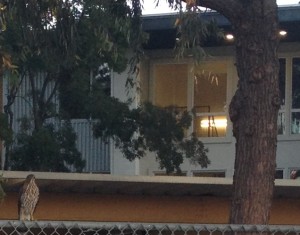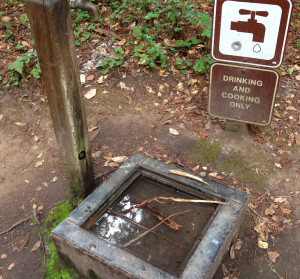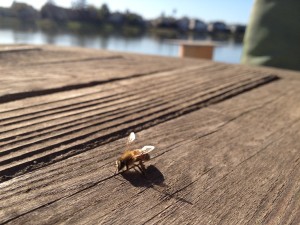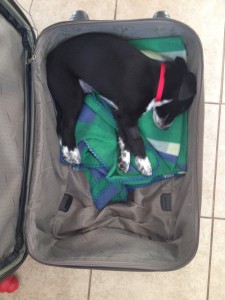 Meandering in my neighborhood park, I notice a bird flapping around a squirrel that is clinging to a tree trunk . The bird is about the same size as the squirrel, maybe a little smaller, so at first it seems like an unlikely cross-species game of tag. The bird swoops around the squirrel, who darts around the trunk. The bird settles on a branch of the same tree, and the two stare at each other, unmoving. Then the dance repeats. I have seen squirrels chase one another–sometimes it feels like play, sometimes like aggressive territoriality–but this has an altogether different feel. There is a sense of urgency here, of desperation. And suddenly I realize that the bird is a falcon. It wants to eat the squirrel.
Meandering in my neighborhood park, I notice a bird flapping around a squirrel that is clinging to a tree trunk . The bird is about the same size as the squirrel, maybe a little smaller, so at first it seems like an unlikely cross-species game of tag. The bird swoops around the squirrel, who darts around the trunk. The bird settles on a branch of the same tree, and the two stare at each other, unmoving. Then the dance repeats. I have seen squirrels chase one another–sometimes it feels like play, sometimes like aggressive territoriality–but this has an altogether different feel. There is a sense of urgency here, of desperation. And suddenly I realize that the bird is a falcon. It wants to eat the squirrel.
I rarely get to see a bird of prey from this close. I take a picture and note its sharp-looking beak. Squirrels may bite and scratch one another, but I have the distinct impression that this beak could slice open the squirrel’s belly, that these claws would sink effortlessly into the squirrel’s throat and flanks. This bird is a killer who has identified its victim, and the squirrel knows exactly what’s going on. It must be a terrifying situation. Your killer is standing not 10 paces from you, looking you in the eye, waiting for you to make a move. Occasionally he rushes past you and a blade whistles in the air. You twist and turn and jump and wonder if you’ve been sliced after all, but you hide as best you can anyway, as your killer settles into place and stares at you again, calculating the best way to attack you.. You will probably die. The killer will probably get you. If not today, then tomorrow. If not this particular killer, then another very much like him.
For most people I know, this is an alien and terrifying situation. We hear about random street violence or about serial killers, we may even know someone who has experienced it or witnessed it. But to die as a result of a deliberate assault by another person remains a rarity in my world. So rare, in fact, that society deems it “unnatural” to die as a result of violent action, and “natural” to live so long that the body gives out, breaks down, falls apart, and dies of its own accord.
But this is not the case for most animals. This squirrel I am watching will probably not live to the point of advanced arthritis, cancer, or neurological degeneration. This squirrel will be killed and eaten – in this order, if he’s lucky, but probably not. I step away from the scene uneasily; I automatically take the side of the “victim”, the squirrel, and want the “aggressor” to lose, to miss, to fly away. But the falcon needs to eat, too. Unlike with pets I care for, I have no vegan solution for the falcon’s nutritional needs. To sabotage his attempt to hunt is to hurt him, just as to allow him to continue hunting is to hurt the squirrel. The sense of horror, or having abandoned a fellow living being to its avoidable and excruciating death, lingers with me.
When this squirrel is sliced open and eaten, would we say that his death was the result of natural causes? If a human were to be sliced open by a lion and eaten, I doubt most people would consider this “death of natural causes”. And yet, what is more natural than a falcon hunting prey to eat?
When I hear about someone who died of “natural causes”, I usually imagine someone who did not die as a result of violence, someone who “died of old age” (a funny expression in its own right – old age is what keeps you alive, isn’t it?). I have now come to think this expression is one of the clearest examples of how distorted my sense of the natural is, thanks to my position as a human in a relatively safe culture.
 A few days earlier, as I am sitting on the dock, I happen to glance out at the water and see something strange. A tiny circle pushing out dense little ripples floating on the water, like a floating miniature sub-woofer. Suddenly I realize what it is: A bee, drowning. In the small community where I live, a few people keep beehives and, for reasons I don’t quite understand, some of the bees end up in the water. The one I am seeing now is far off the bank. Her wings are completely wet, and she is unable to fly. I think about the bees I met while hiking Skyline to the Sea, at Waterman Gap camp – many bees who were drowning or drowned, in the pool of water under the faucet marked “DRINKING AND COOKING ONLY”. I offered them sticks and they clung onto them, so I could pull them out of the water. After a little while they started flapping their wings, experimentally, and eventually flew off. I ended up laying an entire lattice of sticks across that puddle, like a reverse canal system – bridges for drowning bees to climb onto and be saved. So when I see the bee in the water by my house, I go look for a stick long enough to reach it (it never occurs to me to actually get in the water – I automatically accept the fact that the bee will drown if I cannot
A few days earlier, as I am sitting on the dock, I happen to glance out at the water and see something strange. A tiny circle pushing out dense little ripples floating on the water, like a floating miniature sub-woofer. Suddenly I realize what it is: A bee, drowning. In the small community where I live, a few people keep beehives and, for reasons I don’t quite understand, some of the bees end up in the water. The one I am seeing now is far off the bank. Her wings are completely wet, and she is unable to fly. I think about the bees I met while hiking Skyline to the Sea, at Waterman Gap camp – many bees who were drowning or drowned, in the pool of water under the faucet marked “DRINKING AND COOKING ONLY”. I offered them sticks and they clung onto them, so I could pull them out of the water. After a little while they started flapping their wings, experimentally, and eventually flew off. I ended up laying an entire lattice of sticks across that puddle, like a reverse canal system – bridges for drowning bees to climb onto and be saved. So when I see the bee in the water by my house, I go look for a stick long enough to reach it (it never occurs to me to actually get in the water – I automatically accept the fact that the bee will drown if I cannot find a stick long enough, as if its life is only worth so much discomfort on my part). By the time I come back from the yard with a stick, I cannot see the bee. I go to the other side of the dock and there it is, or at least another one very much like the first. I hand her the stick, she immediately climbs on, and I place her gently on the sun-soaked table on the dock, where she slowly recovers (I imagine I hear her coughing) while I take close-up shots of her – probably not her most flattering, but then it’s unlikely that she is reading this blog, or knows anyone who does.
find a stick long enough, as if its life is only worth so much discomfort on my part). By the time I come back from the yard with a stick, I cannot see the bee. I go to the other side of the dock and there it is, or at least another one very much like the first. I hand her the stick, she immediately climbs on, and I place her gently on the sun-soaked table on the dock, where she slowly recovers (I imagine I hear her coughing) while I take close-up shots of her – probably not her most flattering, but then it’s unlikely that she is reading this blog, or knows anyone who does.
Two days later, I am on the dock again, and I see more drowning bees in the water. I rescue two, one of them falling repeatedly into the water from my stick before she manages to form a good grip.. Drowned and dead bees float by. I place the rescued bees on the same table that received their sister earlier in the week. As I climb back to the couch I was sitting on, it occurs to me that while I enjoy myself here on the dock, more bees will fall into the water and float past me, drowning and dying – it seems unlikely anyone else will bother fishing them out. I accept this, with less discomfort than I anticipated. Apparently, a part of me believes that I have fulfilled my quota of life-saving for the day or for the week. Let the rest die while I have my fun (I argue with myself a little over this: What’s the alternative? Setting up camp at the dock and dedicating my life to rescuing the endless stream of drowning bees? And what about other drowning insects elsewhere in the water? Somehow, dedicating my life to saving drowning insects does not feel like the right thing to do, despite the fact that it’s the most direct service I can imagine; what are the implications in terms of my willingness to dedicate my most precious resource, my time, to alleviating the suffering and death of any other animal, including humans?).
When those bees drown, would we say that their death was the result of natural causes? Certainly no direct violence had been inflicted here. I wouldn’t say the water is violent toward the bees. There was no malintent on anyone’s part here. But if a human were to fall into a river and drown, would we say that he died as a result of natural causes?
And then there are birds. So many birds. Presumably they all die at some point, although science has yet to prove that – perhaps they ascend directly to heaven, or burst into a cloud of photons, who knows. But it seems likely they all die in the more common sense – heart stops, brain stops, body left behind as an unmoving, unfeeling, inactive lump of flesh. But where are all the bodies? The streets should be littered with them. And if not the streets, then at least the parks. And even if they fly away somewhere when ti’s time to die, I would think I would at least see the forests carpeted with dead birds. But they are not there. Seeing a dead bird is a fairly rare event in my life, certainly rare enough for me to take note of it. Sometimes I see what looks like an exploded bird on the side of the road – one of those birds who did not adhere to the Pigeon Convention that Jerry Seinfeld introduced to the world. It’s even more rare for me to see a bird dead on a sidewalk, apparently having fallen from the sky and died. Of old age? It’s hard for me to estimate the age of a bird, but I suppose it’s possible (“Have you heard what happened to Fritterwind? He was always so fit, you know, constantly flying around and eating the right things, and then BAM, the big one, right as he was flying across El Camino. Such a shame”). Although it’s just as likely that a clumsy bird of prey dropped it, or that it got electrocuted, or that it flew into a window and broke its own neck (thanks, Windex!).
So – where are all the dead birds? The only explanation I can think of is that all of them, more or less, have been eaten. Is this death of natural causes? And if instead of birds those were human beings who were disappearing, never to be found, presumably eaten by predators, would we consider this death of natural causes?
And then, of course, there are the countless animals people hurt directly and indirectly – starting with climate change, passing through road kill, and ending with killing for food. Are these deaths of natural causes?
If people are killed by other people (whether or not for the purpose of being eaten), or by other animals, or even drown, it’s hard to imagine such deaths being described as “natural causes”. This is making me wonder about how we use the term “death of natural causes”. It seems somehow wrong to say that violent death, or any death that is not due to having reached the “end of natural lifespan” is natural for some species, but not for others. Somehow justified for some species, but not for others.
That the very notion of “natural” would carry such diametrically opposed meanings for humans vs. any other living being seems deeply wrong. It makes me think that we expect the world to treat us entirely different than it treats anyone else, that we feel entitled to be treated very differently than anyone else, and in turn feel entitled to treat anyone else very differently than we would treat our own kind.
Simply because we can.
____
And, because life isn’t all bad: Here’s my new puppy, Bay, in her convertible.
[sg_popup id=95]

